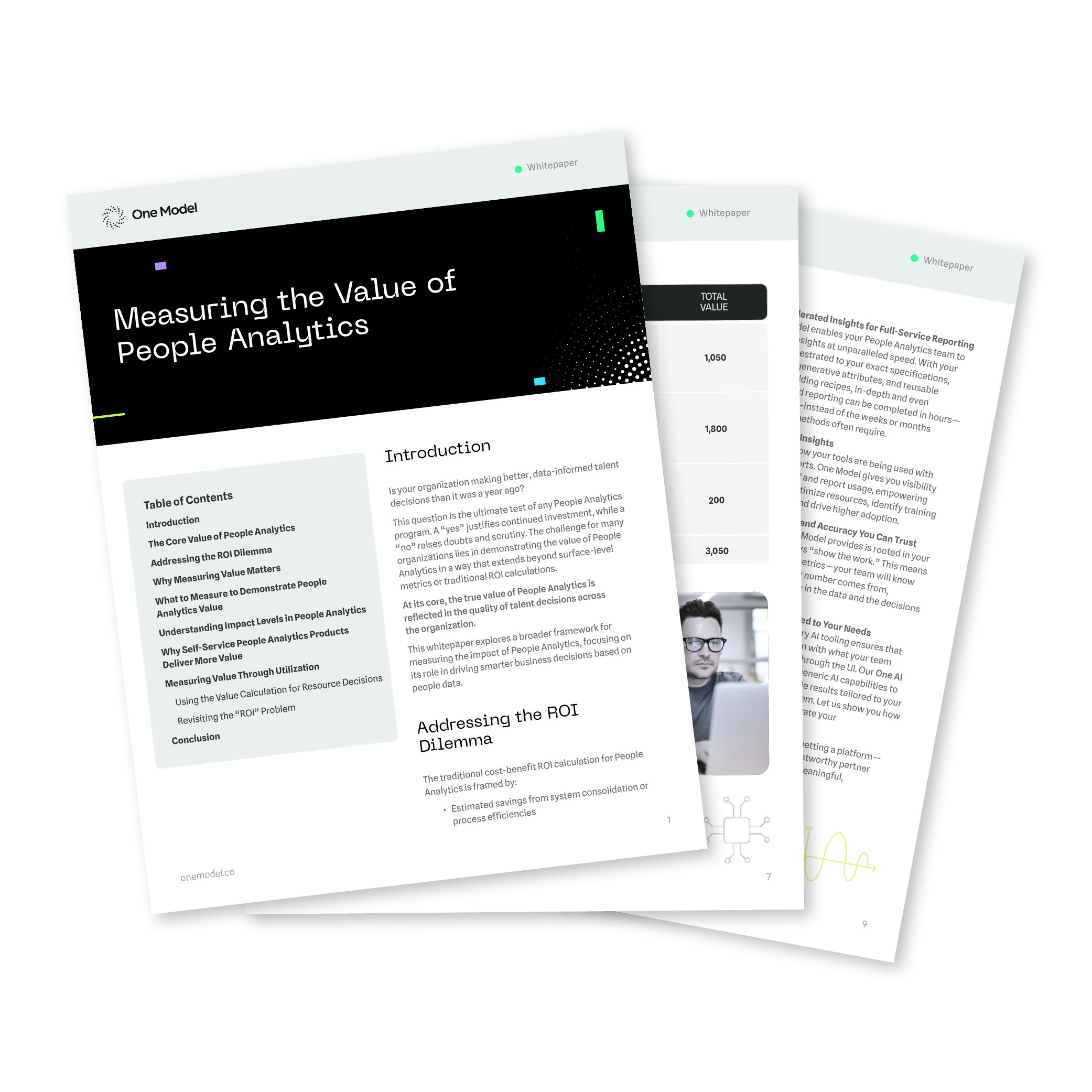How do we measure the value of People Analytics?
Is your organization making better, more data-informed talent decisions today versus a year ago? This is the ultimate test of any People Analytics program, initiative, team, COE, or department. If the answer is yes, the investments in People Analytics continue and expand. If the answer is no, then People Analytics budgets are questioned.
So how can we demonstrate the value of People Analytics? In our latest whitepaper, "Measuring the Value of People Analytics," we address this from the ground up, starting with the mission of people analytics and moving into the utilization of the content delivered by the People Analytics team. Click here to get the full version.
With a more comprehensive view of the how People Analytics creates value, you will be better positioned to build your business case for People Analytics. Whether you are seeking initial, incremental, or transformational level investments, this value framework will help you to convince your organization to become fully invested in HR analytics.
Tackling the ROI Conundrum
The proposed ROI calculations that many vendors recommend for People Analytics are not very good -- and some are downright laughable. This is one of the reasons I worked on this paper.
Two common approaches:
- Estimated savings through efficiencies of system consolidation or process acceleration
- Estimated savings from the consolidation of systems or accelerating processes. Reduction in attrition or faster time-to-fill of job postings or other KPIs.
The promise that People Analytics technology will reduce turnover and putting a financial value on it ... then hiding when the 'Great Resignation' starts or saying 'it would have been worse!' Ugh! This is not honest or helpful. We can do better in declaring the value we propose to generate. This is one of the key points in the paper.
We Need to Address the Big “Why?”
Why are we investing in People Analytics? Is the deliverable we're committing to - the “return” on the investment - as simple as a bit of system and process savings and some hypothetical lift to a couple of KPIs?
Mission of People Analytics:
Drive better, faster, talent decisions at all levels of the organization.
We are investing resources in people analytics to drive and accelerate this mission. The value of People Analytics should be judged by the quality of talent decisions that are being made across the organization.
We may not be able to get directly at measuring the quality of talent decisions (though we will address that in an upcoming paper), but we can use utilization as a proxy to get started. If our People Analytics deliverables are being utilized, we can logically assume that the users are placing value on them. They are 'voting' for the content. If it was not valuable, they would ignore it.
In the paper, we demonstrate how utilization can be used to calculate value with relative ease across your People Analytics portfolio.
Value Journey for People Analytics
Looking at each 'analytics event' through a process sequence, a "value journey," we will see how critical People Analytics content is in delivering value at scale. To impact talent decisions at all levels of the organization, we need to build a smooth and fast self-service cycle (left side) by focusing on:
- creating analytics mindset/culture,
- applying user-centered product design, and
- communicating effectively and applying sound change management.
"We have data that can help here." The diagram below shows the target picture, where a user, encountering the talent elements of a business challenge thinks "We have data that can help here." This is the critical first step that ideally flows them into a set of high-quality People Analytics products that can deliver the needed insights.

Any business challenge can be divided into talent elements (staffing, skills, productivity, etc.) and non-talent elements (market forces, supplier issues, etc.). People Analytics provides value through products and services that support understanding and solving for the talent elements of the challenge. To impact talent decisions at scale requires People Analytics teams to deliver insight-generating self-service solutions.
So now that we’ve covered that, how do we measure the value of People Analytics at your company?
Is there a formula we can use to make our People Analytics investments more intentional? If so, how can we determine: Where we should focus our efforts? What content or communications efforts are necessary to deliver the outcomes we expect?
Another core assumption in People Analytics is that your leaders’ time is a scarce and valuable resource. And we will use that assumption to anchor our value measurement approach. We assume that your organization’s leaders:
- Are selective about what they spend their time on.
- Choose to spend their time on things they consider valuable.
- See value in content if they engage with it regularly.
- Will rely on content that continues to inform better talent decisions over time.
Download the paper to see the way we have calculated the value of a small People Analytics portfolio based on the value-utilization framework.
Further work is needed to articulate how to measure the change in talent decision quality more directly. We will be tackling that in future content -- so keep an eye out for it!





